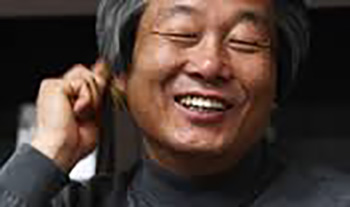
Human rights defender's story: Park Lae-goon from South Korea
Park Lae-goon advocates against state violence and for victims' rights in South Korea, challenging State impunity through his enduring commitment to justice.
Lae-goon Park is a human rights defender fighting for victims of state violence by calling for an end to impunity.
‘As an activist, I cannot turn my back on victims seeking the truth. Human rights work is my life and destiny.’
Park’s life-long career began as a student activist along with his younger brother during the Democratic Uprising in South Korea in the 1980s. His brother burned himself to death seeking an end to the impunity of the Gwangju massacre. This event galvanized Mr. Park to continue his career as a human rights defenders fighting for the disadvantaged and marginalised people of South Korea that has lasted to this day.
‘When fighting against State violence, I want to see the perpetrators brought to justice by the Government but often the Government is the one protecting them.’
Park feels that it is difficult to end impunity in South Korea since it is very rare that investigations regarding violations are opened and even rarer that they progress to a courtroom. When he fights against such a ‘great, big power‘ he often feels frustrated. However, this has not stopped him from continuing to call for an end to impunity.
Park spoke to ISHR about some of his greatest achievements. Beginning in 1997, he worked toward opening an investigation and bringing to justice perpetrators of human rights violations committed in a facility for the deaf and hearing-impaired. In 2003, seven years later, the violators were convicted and removed from the centres. He was also involved in seeking justice for Kang Ki-hoon in what some have called South Korea’s version of the Dreyfus affair, in which the political scandal became a highly divisive issue for decades. In 1992, Kang was convicted and imprisoned for aiding and abetting the suicide of a fellow activist and allegedly forging his will. More than 20 years later, the Seoul High Court said Kang was not guilty, on the basis of there was a lack of credible forensic evidence.
In 2009, Park formed an organisation called the Justice for the Yongsan Evictees in response to the Yongsan Tragedy. Park described the event as a ‘stark violation of civil rights’[1] in which a redevelopment project led to forceful evictions and demolitions of a neighbourhood in Seoul. The appeal process by the evictees was stifled by private security forces. This evolved into an occupation on the rooftop of a Namyang building, ending in a clash between police and protesters resulting in the death of 5 tenants and a policeman. While all of the policemen were acquitted, nine of the protesters were convicted and jailed, including himself.
‘The court’s ruling was clearly biased and ignored the evictee’s suffering. It was a political decision which violated the basis of law, justice and conscience.’[2]
Park talked to ISHR about what drives him: ‘my main goal is to emphasise the right to peaceful assembly. The criminalisation of protesters has a chilling and detrimental effect on society.’
More recently, Park found himself, once again, in a prison cell for 110 days for organising a protest for the victims of the Sewol Ferry capsizing. This marks the fifth occasion in which he had been detained for being involved in protests.
On April 16, 2014 a ferry capsised killing 304 of the 476 passengers aboard causing widespread social and political criticism of the Korean Government for its disaster response and cover-up. Park is a standing committee member of Coalition 4.16, an alliance of victims’ families, individual supporters, and South Korean NGOs calling for an independent and impartial investigation into the Sewol Ferry disaster. He organised a demonstration highlighting impunity exactly one year after the incident. During the demonstration, Park was arrested and detained for the violence that occurred during the protest. However, he was not involved and did not incite the outburst. ‘As a symbolic figure, I was intentionally targeted’, he explains.
‘Freedom of assembly, association, and expression are shrinking in South Korea. I hope to stand in solidarity with other human right defenders to promote global action.’
Park’s interaction with UN mechanisms has become more optimistic with Maina Kiai’s recent visit in January 2016. The Special Rapporteur’s visit was the first information-gathering mission to South Korea by an independent expert mandated by the UN to monitor and promote the realisation of the rights to freedom of peaceful assembly and of association worldwide. In Kiai’s statement, he mentioned Park’s detention by highlighting that:
‘[t]hese actions deter active and would-be assembly organisers and participants. I am confident that authorities have the capacity to identify and isolate those engaged in criminal acts without resorting to investigation methods that weaken the right to peaceful assembly. Let me underline that organisers of peaceful assemblies should not be held liable, under any circumstances, for the criminal actions of others.’[3]
In the past, Park felt that the UN human rights mechanisms have a long response time for the domestic advocacy goals he is fighting to achieve. However, he believes that the compilations of cases and complaints by the UN will eventually be used to move forward to battle impunity and open space for freedom of assembly and expression.
Park also acknowledged the support many South Korean activists receive from international groups which helps to raise global awareness of issues in South Korea and pressures the government to provide a safe and enabling environment for defenders. He hopes that all of this along with political progression domestically will take human rights defenders out of the dark in South Korea.
‘Even though justice is slow, the fact that it is improving little by little helps me to maintain hope and continue to work hand in hand with victims.’
